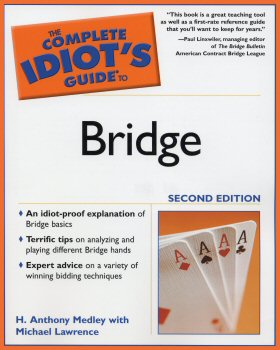| The first edition of Complete Idiot's Guide to Bridge by H. Anthony Medley was the fastest selling beginning bridge book, going through more than 10 printings. This updated Second Edition includes some modern advanced bidding systems and conventions, like Two over One, a system used by many modern tournament players, Roman Key Card Blackwood, New Minor Forcing, Reverse Drury, Forcing No Trump, and others. Also included is a detailed Guide to Bids and Responses, along with the most detailed, 12-page Glossary ever published, as well as examples to make learning the game even easier. | ||
|
Pete Seeger: The Power of Song (7/10) by Tony Medley Folk music, almost by definition, is about protest and dissent. It became my favorite genre when I was in college, and not because I was protesting anything. I had liked Tzena, Tzena, Tzena and Goodnight, Irene and Sweet Violets when I was growing into a college man, but it was The Kingston Trio that really captured me. Throughout the Ď60s, even through Beatlemania, I still loved Folk Music, exemplified by The Mamas & the Poppas, Peter Paul & Mary, Simon & Garfunkle, Donovan, and all the others. The main reason I continue to pay for XM Radio is because it offers a Folk station that plays nothing but Folk Music, including a show hosted by Bob Dylan. I loved the music even though I didnít necessarily agree with any of the messages conveyed by the writers, singers, and songs. This is a film about the guy who resurrected Folk Music, Pete Seeger. It tells his life story in his own words and in the words of his wife, Toshi, along with those of contemporaries and successors, including Joan Baez, Bonnie Raitt, Bruce Springsteen, Natalie Maines (of the Dixie Chicks), Tom Paxton, and Peter Yarrow and Mary Travers of Peter, Paul and Mary. OK, they are all left wingers, but thatís the nature of the folk music genre. It doesnít negate the quality of the music. If we were going to have a political debate, I would undoubtedly be on the other side of the fence from all of these, especially Seeger. But I love their music. This is a 93-minute film that is fascinating for the first 75 minutes. It completely falls apart in the last 15 minutes or so when it switches to Seeger saving the Hudson River. I kept thinking of the line from The Ballad of Davy Crockett as I was watching the film imply that Seeger single-handedly cleaned up the river. The apocryphal song tells us that Davy Went down to Washington, so I hear tell And patched up the crack in the Liberty Bell. But before Pete cleaned up the river, he was out there fighting for the things in which he believed. In his youth he was a member of the Communist Party. He traveled around with the legendary Woody Guthrie, finally forming a group called the Almanac Singers composed of the two of them and anyone else they could find to join them. He also wrote at least one song with Woody, Round and Round Hitlerís Grave. After service in the Army in WWII, he formed The Weavers and began, or continued, a lifetime devoted to furthering the things in which he believed, all through folk music. The film shows how he suffered for his beliefs through the Blacklist. He was kept off TV for 17 years until The Smothers Brothers brought him onto their show in 1969. Even so, it didnít seem to dim his enthusiasm for the music or his ideals. Had this ended 15 minutes sooner, it would have gotten my top rating. But the last segment is long, slow, and uninvolving. Even the music is second-rate. But thatís what you might expect from a family produced documentary. I wasnít much of an admirer of Bruce Springsteen until he put out his album of folk music. Itís as good as anything Iíve heard, and Iíve heard a lot. Forget the politics and beliefs, I love folk music and the people who create and sing it. Even considering the last 15 minutes or so, this is one I wouldnít have missed. On top of Seegerís interesting life, you get to hear lots of great music, too! November 6, 2007
|
||
|
|
||
